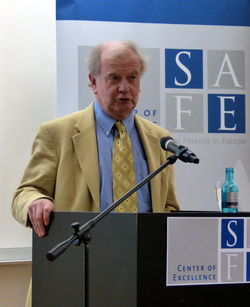 On 9 December 2013, Donal Donovan, Adjunct Professor at the University of Limerick and Visiting Lecturer at Trinity College, presented some insights into the Irish financial crisis, including the deficiencies of the euro area architecture and the highly controversial Irish government guarantee for banking system liabilities. The lecture was part of the SAFE Policy Center Lecture Series.
On 9 December 2013, Donal Donovan, Adjunct Professor at the University of Limerick and Visiting Lecturer at Trinity College, presented some insights into the Irish financial crisis, including the deficiencies of the euro area architecture and the highly controversial Irish government guarantee for banking system liabilities. The lecture was part of the SAFE Policy Center Lecture Series.
Donovan had worked at the IMF from 1977 to 2005 before retiring as a Deputy Director. He was a member of the two official enquiries into the causes of the Irish financial crises and appointed to the Irish Fiscal Advisory Council in mid-2011. Being the co-author of the recently published book “The Fall of the Celtic Tiger: Ireland and the Euro Debt Crisis” (Oxford University Press), Donovan explained that the recent economic turmoil in Ireland can be considered to be a “story of four interrelated crises”. The first crisis was a property crisis that popped up in 2007 when the housing bubble, which had been growing from 2002 onwards, collapsed. The second crisis was a banking crisis that evolved when the reckless lending from abroad, which had been practiced in the run-up to the global financial crisis, came to an abrupt end. This has significantly contributed to a liquidity crunch, and finally to total insolvency of several Irish banks. The third crisis was a budgetary crisis, which arose when the increase in public expenditures, fuelled by buoyant property related taxes that enabled the government to overspend and under-tax, experienced a complete melt-down in 2007-08. Finally, these crises resulted in a fourth one, a full-blown financial crisis, when budgetary and banking problems destroyed sovereign creditworthiness, and left the government with no alternative but to ask for a bail out by the Troika (European Central Bank, European Commission and International Monetary Fund).
Referring to their book, which aims at clearing up several myths about the root causes of the above mentioned crises, Donovan emphasized that Ireland’s financial indebtedness was not mainly due to the banks. Only a quarter of the increase in the debt-to-GDP ratio is attributable to the recapitalization of its banks by the government, whereas three-quarters stem from loans from the European Union, other European countries and the International Monetary Fund for financing the Irish budget deficit. One important weakness in the Irish public debate in his view is that it is still very much shaped in terms of “we” and “them”. The idea that the Irish are part of the European Union has, to date, not really been embraced. For example, the attitude towards the ECB in Ireland is rather defensive. It is considered by many as a very strict taskmaster aiming at “getting money back for reckless European lenders”. Donovan does not agree with this view. He considers the ECB’s mandate and goals as right in substance. Nevertheless, he suggests a more effective communication strategy for avoiding misunderstandings and counterproductive reactions in the future.
The lively discussion that followed the lecture brought up many questions, for example regarding the danger of upcoming bubbles or the corporate tax regime in Ireland, which was criticized by one discussant as too business-friendly and unfavorable to the Irish budget. Also, the attempts of building a European fiscal union were mentioned, which are de facto hampered by this kind of low-tax regime. Finally, the question was raised why there had not been strikes or riots in Ireland as a reaction to the downsizing of the public sector and why the troika program was broadly supported by politicians. Donovan’s answer to this was very clear: The Irish are not a “docile people”, but rather “a pragmatic people who like to party but are well aware that the morning after there is a bill to be paid”.

